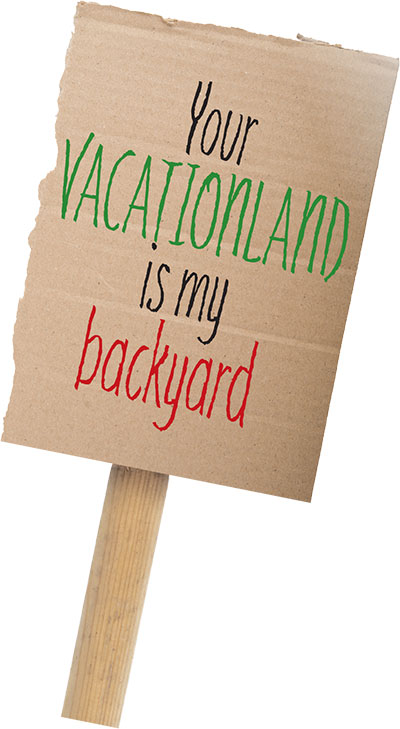By Jesse Ellison
From our March 2023 issue
Let’s start by acknowledging that change can be hard, and it can be scary. People tend to dislike it. We crave consistency. We want to be certain of outcomes, to know that everything will be okay and that what’s true today will be true tomorrow. Many of us, especially if we’re comfortable, prefer for things to stay basically the same. It’s actually how our human brains are wired.
It seems like a cosmic joke, then, that stasis is impossible. That change is, of course, inevitable. And in Maine, in recent years, the waves of change have felt unceasing. Mill closures have upended communities across the state. The fishing and lobstering industries have faced tightening regulations and a transforming gulf. The pandemic prompted an unprecedented influx of home buyers from out of state. In many communities, Maine’s housing shortage feels severe enough to put our entire economy at risk.
What does all of this mean for this state we love? What is Maine when the lobster boats disappear from the harbors? What is Maine if only a fraction of those who grew up here can afford to live here? What will become of our character? What will become of us if we lose it?
These questions, these worries and fears, are not new, nor are they unique to Maine, although Charles Colgan, economist and professor emeritus at the University of Southern Maine’s Muskie School of Public Service, acknowledges that “it is characteristic of Maine to kind of obsess over these things.” More so, he adds, than elsewhere in New England — although not without reason.
“The demographic and economic factors that shape what people think of as ‘Maine character,’ they’re just rapidly ending,” Colgan told me recently. “The notion that we’re going to be able to live with the character of Maine from the ’70s is not going to be tenable — but it’s not going to be recognized as untenable, and there are going to be big fights about it.”

Among the things we already fight about: a glut of short-term rentals hollowing out formerly year-round communities, helping send home prices soaring; more and bigger cruise ships, dropping thousands off in communities where only thousands live; and, of course, ever more new residents bringing city money, city tastes, and city expectations. We lament the loss of character when a town’s economic base shifts from fishing to tourism, when a once-working-class neighborhood, like Portland’s Munjoy Hill, gets covered in pricey condos, when leaders push to ease development restrictions on formerly agricultural land. Land trusts and preservation organizations rely on appeals to character to preserve threatened spaces. Meanwhile, the word is so frequently conjured as a cudgel to prevent new development — and increasingly understood as a tool of historically racist housing policies — that a state commission last year recommended it be eliminated from housing law altogether.
Hear it in enough contexts and “character” can start to seem so slippery as to be meaningless. A word without substance. A word that means what we want it to mean.
If you’re reading this magazine, you probably have your own understanding of Maine’s character and, likely, some urge to protect it. But how possible is this if we’re using the word to describe different things? And what, exactly, are we protecting Maine’s character from? Outside forces? Change? Those people? It shouldn’t have to be said that it’s despicable to invoke “character” to keep away low-income families or people of color. But what if it’s seemingly rapacious developers? What if it’s franchises? What if it’s wealthy Massholes?
One sentiment that’s as much a part of the Maine character as anything: “If you come to Maine because of what Maine offers, don’t try to change it.” That’s how Kate Dufour, who runs the nonprofit Maine Municipal Association, articulates it. “People who move from Boston for the quality of life and then expect us to be like Boston? Yeah, you have to take your own trash to the landfill. We’re not changing that. Yeah, you live on a dirt road. We’re not changing that. Yeah, we have town meetings. We’re not changing that.” And yet, Dufour adds, “If we’re going to survive, we’re going to have to evolve and grow.”
Dufour advocates with state and federal legislators for the interests of Maine local governments on issues that include taxes, housing, and zoning. When I first got her on the phone, she was hesitant even to talk about character. Was I taking the position, she asked, that the word was an instrument of racism? In 2021, Dufour was a member of a state commission assembled to “increase housing opportunities in Maine by studying land-use regulations and short-term rentals.” Among the commission’s recommendations was striking the word from housing law, excluding “character” as a legal basis for zoning regulations. Dufour, along with every other member present, voted in support of that recommendation. The Maine Municipal Association, however, ultimately came out against the bill that emerged from the commission’s work, on the basis that it stripped too much power from local governments. The legislation that was passed last spring, with narrow bipartisan support, permits more dwellings to be built on housing lots, among other things, but it didn’t contain the “character” clause.
Ryan Fecteau, then Speaker of the Maine House of Representatives, introduced the bill establishing the commission. He calls the legislation that came out of it “the crowning achievement” of his time in the legislature. “These are challenging conversations,” he told me. “But ‘character’ is another word for ‘status quo.’ It’s another word for, ‘I’ve obtained prosperity, and I want to make sure no one else does.’ That’s a fundamental unfairness. It’s also a red herring. Because the reality is we will not be prosperous as a nation or as a state if people cannot obtain housing.”

Fecteau likens the use of the term “character” to America’s history of redlining — the system of racist housing policies that kept people of color and lower-income Americans from buying in certain neighborhoods, beginning in the 1930s. He’s far from alone in voicing criticism of exclusionary zoning policies, and anyone who’s worked in housing policy can attest to how “protecting character” is often deployed as a blanket shield against any kind of development.
Jeff Levine, the city of Portland’s former director of planning and urban development, who now teaches urban studies and planning at MIT, says that his students are increasingly wary of terms like “character” and “historic preservation,” hearing only a proxy for NIMBYism and anti-housing attitudes. “It’s not always that simple,” says Levine, who also sat on the state’s housing-opportunity commission. “For a long time, the general sense was that historic preservation was important and a way to protect. In students now, I see a flip. They think ‘preservation’ is just a way for people to say they don’t want affordable housing nearby. I have to say, ‘Well, sometimes it’s important.’ There’s really a hostile response to preservation as an effort.”
Even apart from who it dispossesses, Levine says, using “character” to thwart change can have unintended consequences. “There’s often an assumption that the way you preserve the character is stopping everything from happening,” Levine says. “In reality, sometimes that accelerates the loss.” Adding multi-unit housing may change the feel of a mom-and-pop-y downtown, in other words, but not as dramatically as a Main Street full of empty storefronts. “Things will change,” Levine says, “and if nothing is changing on the surface, that usually means that housing is becoming more expensive.”
Kevin Sutherland was Bar Harbor’s town manager from January of 2022 through January of 2023, following stints in town government in Saco and Ithaca, New York. “I’ve heard it in every town I’ve worked in,” he told me with a sigh. “‘That development project doesn’t fit the character of this neighborhood.’ The term has been used to keep things from changing. It’s an element of why we have such a shortage of housing.”
When Sutherland, whose salary started at $115,000, and his partner, who works at Bar Harbor’s Jackson Laboratory, began looking for houses in the area, everything they found was either far too expensive or in need of far too much work. Sutherland says they made one offer on a house — listed at an “obscene price” — that was later bought by a private company to operate as an Airbnb. He and his family ended up moving to Trenton, just across the Mount Desert Narrows. During his tenure as town manager, it took him 45 minutes to get to work each morning because he first dropped off his kid in Southwest Harbor, the closest place his family found daycare, then backtracked to his office.
One hears similar stories across the state. Last March, for example, when Rockland tried to hire a new police chief, at a salary of $90,000, the first candidate offered the job turned it down, citing the cost of homes in Knox County, where, last summer, the median sale price reached $425,000. “People in Maine are driving an hour and a half to get to where they work,” Fecteau told me. “Talk about the character of the community. We should expect that the people who serve our community — whether in public safety or education or retail — can be members of our community.”

Wariness of development isn’t the only factor inflating Maine’s real-estate prices. In 2021, to combat spiraling housing costs, Bar Harbor passed an ordinance putting a cap on the percentage of homes that can be run exclusively as Airbnbs or other short-term rentals (homeowners who rent rooms or rent for only portions of the year are in a separate category). That currently describes some 15 percent of the town’s housing stock, and the new cap means no entity can buy a home for that purpose until the percentage dips below 9 percent. One side effect: short-term rental operators almost immediately started buying up housing in neighboring communities, Sutherland says. The adjacent town of Mount Desert is now considering a licensing ordinance, responding to critics who argue that short-term rentals “destroy the traditional character of neighborhoods,” as the local paper put it.
Another flashpoint for those concerned about the erosion of Bar Harbor’s character: cruise-ship visits, which have doubled and then some over the last 20 years. Sutherland worries, though, that an ordinance passed in November, putting a 1,000-person daily limit on the number of passengers allowed to disembark, is going to have its own unintended consequences. In January, a nonprofit representing business owners filed a lawsuit against the town, and Sutherland told me he anticipated others, including from the pilot’s association, whose members depend on ship traffic and which had alerted him last December that they’d hired an attorney (shortly after we spoke, the pilot’s association joined the business owners’ suit as an intervenor). Sutherland points out that MDI’s Acadia National Park sees some 4 million annual visitors, while Bar Harbor’s cruise-ship passengers number around 300,000. Before the ordinance, he and other officials had been making progress working with cruise lines and other entities to reduce congestion. Now, the harbormaster is trying to figure out a system to count disembarking passengers. I asked Sutherland, jokingly, how about turnstiles? He didn’t laugh.
Debora Keller has worked in community development for some 30 years and lived in Bath for 23 of them. These days, she runs Bath’s housing authority and sits on a committee tasked with reexamining the city’s comprehensive plan. “What’s fascinating is understanding how deeply rooted housing policy is in what communities are,” she says. “The issue is that there’s a bit of a delay: housing policy plays out over the years, and all of a sudden, you look back and say, ‘Oh my god, how did we get here? Why can’t our kids move back here? Why can’t our teachers find a place to live?’”
The street she lives on, Keller says, includes a mix of trailers on foundations, duplexes, four- and six-family multiplexes, and stately, historic captains’ homes. “It’s the most eclectic housing you can imagine,” she says. “All of Bath is like that. But if you look at the zoning code, you could not build Bath in that way today.” That’s because Bath, like so many towns and cities across Maine, uses zoning and building codes that favor a suburban model — single-family homes on large lots — put in place without much thought decades ago, when avoiding downtown density was the primary goal.
Today, economist Colgan points out, when we refer to “the character of Maine,” we tend to be talking about rural character, about housing policies that favor single-family homes on two-acre lots. “The dominant use of the term ‘character’ has been to fight density, to put it simply,” he says. “That’s, of course, all wrong, because multifamily housing was standard in much of Maine up until the post-war building boom.” Boarding houses were commonplace before World War II, Colgan says. Now, in most communities, they’re illegal. “We’ve so restricted the amount of housing that can be built that we’re looking at severe shortages and major price increases. Shockingly, there are homeless people now. We look around and say, ‘Where did these homeless people come from?’ And the answer, of course, is that we zoned them out.”
“Character is so elusive,” Keller says, “and like tradition, you have to be careful that it doesn’t get dangerous. Bath has traditionally been a mostly white community. Is that something we want to preserve? No. At the same time, you start to welcome and bring new people in, and what if the new people are detrimental to your character?” She cites stories she’s heard from other town officials in Maine, complaints about people from out of state buying multimillion-dollar homes, then showing up at council meetings and complaining because they can’t find a plumber — because plumbers, of course, can no longer afford to live there.
In Keller’s view, character comprises people as much as architecture and other observable attributes. Bath is historically a shipbuilding community, a working-class town. And although Keller says she has sometimes heard pushback on affordable housing from residents who don’t want “those people,” the consensus is that no one wants Bath to turn into a community that welcomes only the wealthy. The current draft of the city’s new comprehensive plan puts it this way: “Everyone who works here, grew up here, wants to stay here, or wants to come here has a reasonable opportunity to live here.”
“Community after community is beginning to recognize that we have to look deeply at housing policies and examine whether they align with how we want to look in 20 years,” Keller says. “If we’re not careful, we’re going to end up being an Idaho or a Montana, a bifurcated state where the only people who can live here are the very poor and the very rich.”
“Change is constant,” acknowledges Nancy Smith, executive director of the nonprofit GrowSmart Maine, which advocates for development policies and projects it deems compatible with Maine’s quality of life. “What matters,” she goes on, “is who gets to decide the whats and hows of that change.”
According to Smith, a former forester, farmer, and state legislator, Mainers shouldn’t let a rush to build more housing threaten farmlands and other little-developed landscapes. “Nobody comes here to take pictures of the suburbs,” she says. But in her mind, Maine’s character is also colored by more than just its rural spaces. For one thing, it involves a rare blend of independence and interdependence. “Feeling like you’re part of the community is absolutely a part of it,” she says. “Mainers have this unique and, I would say, special thing where we help our neighbors while also mostly leaving them alone.”
Also integral, Smith says, are the state’s heritage industries — fishing, farming, forestry, tourism — and not because they are quaint or ornamental. “That’s my pet peeve,” she says. “I came to Maine as a forester and then was married to a farmer for 20 years. It is not quaint. It is really hard work.”

As for “who gets to decide,” Smith thinks that maintaining Maine’s quality of place requires some statewide policies and standards — to prevent, for example, the kind of ripple effects that Bar Harbor’s ordinance seems to be having for the rest of MDI. In agreement is former House Speaker Fecteau, whose legislation loosens zoning restrictions across the state and allows duplexes and accessory dwelling units on single-family lots. Local governments can be too slow to enact much-needed zoning changes, Fecteau says, and the people who stand to benefit from them don’t always have a voice — not least because they may not live in the community in question. Those opposed to, say, a multifamily unit in their neighborhood may have the time and opportunity to object in a town meeting that those who support it don’t. “It’s easy to be motivated to speak when you’re in opposition to something,” he says. “But folks who support things often get left out. There’s just not as much incentive.”
In 2021, an Island Institute report on the state of Maine’s working waterfronts reached a similar conclusion: that when it comes to preserving access for Maine’s fishing and marine industries, a statewide action plan is preferable to “an inconsistent application at the municipal level . . . based on the interests of councilmen and women.” The current approach, the report says, is “scattershot and catch-as-catch-can,” with a coalition of underfunded agencies and nonprofits shifting their focus as threats crop up. Sometimes it works, as in 2021, when the newly formed Sea Meadow Marine Foundation completed a $1.22 million acquisition of a 60-year-old Yarmouth boatyard. Brunswick’s Coastal Enterprises, Inc. and Freeport’s Elmina B. Sewall Foundation helped achieve financing for the property, now a marine-business hub, which had been developer bait on the open market.
Other times, however, it falls short, as in countless instances when new coastal-property owners have denied overland access to clammers and others, diggers who once reached mudflats on handshake agreements with previous owners. Once such access points are lost, the report declares, they don’t come back — and the domino effect can threaten not only marine livelihoods but also other local businesses, a town’s tourism appeal, and more. Enacting a statewide comprehensive strategy to preserve working waterfront “will be expensive,” the report concludes, “but failing to take action will cost us dearly in ways we cannot fathom. . . . Simply put, Maine is not Maine without a gritty working waterfront.”
Gritty harbors, livable communities, open spaces — it’s a starter list, anyway, of all the things that Maine wouldn’t be Maine without. And yet, as GrowSmart Maine’s Smith suggests, the state’s character may simply be more than the sum of its parts.
“Close your eyes and say ‘Maine,’” she says. “What are the pictures and sounds that come to mind? That’s as close as I can get to defining the character. For me, I see the natural environment, the roadside beauty, the dark skies, the absolute quiet. . . and the sense of coming home, whether you grew up here or not.”
* This story has been amended from the March 2023 print version to reflect that the Penobscot Bay & River Pilot’s Association joined a lawsuit against the town of Bar Harbor and Kevin Sutherland resigned as Bar Harbor town manager, both shortly after the issue went to print.




